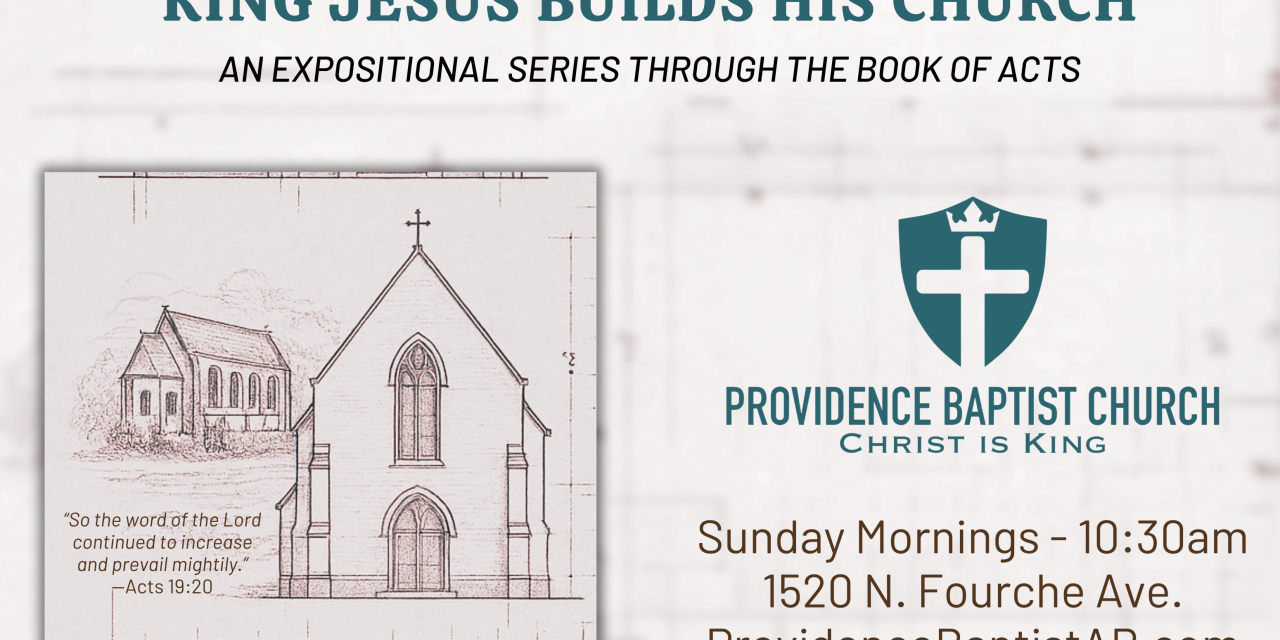We had a technological glitch at our church on April 6, 2025 and we didn’t get our sermon recorded like we wanted. That lead to me writing a short post overviewing the book of Acts for our congregation at Providence Baptist Church. I thought I would post that work in its entirety below. I hope you find it edifying:
We will use the acronym “ACTS” to give an overview of this wonderful book of the Bible.
- A – Authorship
First off, who wrote this? Acts 1:1 gives us a clue—it’s the second book addressed to Theophilus. Flip back to Luke 1:1-4, and you’ll see the first one: the Gospel of Luke. So, Acts is part two, written by the same guy. His name? Luke.
The church has said so for nearly 2,000 years, and it checks out biblically. Paul lists Luke as a companion (Colossians 4:14), but Acts never names him. Instead, starting in Acts 16:10, the author switches to “we”. By simple process of elimination we understand it’s Luke, the physician.
Theophilus—“Lover of God”—might’ve been a Roman official, maybe even a benefactor funding Luke’s work. Here’s a play on words: if you love God, you’ll love Luke and Acts. I won’t bore you with too much debate on this—it’s Luke, and in the words of the great theologian, Forrest Gump, “that’s all I’ve got to say about that.”
Here’s what I can’t skip: Luke didn’t write alone. The Holy Spirit was behind, in, and through his writing so that every jot and tittle is the Word of God. Luke researched, interviewed, and did his homework, but every word he penned is God’s— inerrant, infallible, sufficient, clear, necessary, and authoritative.
A final note on timing: I’d put it around 62-63 A.D., before Jerusalem fell and Paul’s second imprisonment.
- C – Content
Next, what’s included in Acts? This book covers roughly 30 years, from Jesus after His resurrection to Paul’s first stint in Rome around 60-62 A.D. Acts 1:8 maps it out—the gospel starts in Jerusalem, hits Judea and Samaria, and ends in Rome, essentially the world’s capital.
What a journey! We meet a lot of folks along the way. Simon the Sorcerer, godly Dorcas, and Eutychus—don’t fall asleep during sermons! There’s famines, martyrdom, shipwrecks, demons, riots, miracles, and God directly taking out Ananias, Sapphira, and Herod.
Through it all, there’s a steady beat: The kingdom can’t be stopped—check Acts 6:7, 9:31, 12:24, 19:20, 28:30-31. The gospel keeps growing. D.A. Carson puts it well: “Luke is showing how God’s plan, fulfilled in Jesus, keeps unfolding in the early church.”
Two big highlights: people get saved—a lot of them. Pentecost brings 3,000, Acts 4 adds 2,000, then Samaritans, the Ethiopian eunuch, Paul, Cornelius, Lydia, the Philippian jailer, Crispus, and more. Poor, rich, Jews, Gentiles, learned, unlearned, men, women—the Spirit’s working, hearts are turning, and lives are changed. This is our family tree.
Also, churches pop up everywhere—Jerusalem, Samaria, Antioch, Ephesus, Philippi, Corinth, Rome, and on and on and on. Saved folks get baptized and join these local congregations. Acts 15:41 shows Paul strengthening them. 14:23 shows formal structure. 2:41-47 shows membership. It’s Jesus building His church.
Acts, along with the rest of the New Testament, reminds us that there is no proper understanding of biblical Christianity separated from life in the local church.
- T – Theology
Four areas stand out. We will grow in these areas along the way.
- Christology: Jesus is the ascended King, extending His church worldwide. “Lord” (Kurios) shows up 107 times—Jesus is God, not just a savior or friend.
- Pneumatology: The Holy Spirit’s in over 50 verses, opening hearts, granting power, and working wonders. He’s God too (Acts 5). The church stands in desperate need of His work.
- Ecclesiology: Churches start here—baptism, preaching, elders, prayer. They’re messy at times but united.
- Soteriology: Acts 4:12 is a beautiful summary. All our hope is in Jesus. Salvation is by grace alone through faith in Christ alone. In Acts, Jesus is preached from the Old Testament. The gospel of Acts is the only gospel. It’s our gospel too. The apostles preached His righteous life, His death in our place, and His glorious resurrection.
- S – Substance
Finally, what’s the core of Acts? Not just “Acts of the Apostles”—that’s too small. The Spirit and Father are essential, but here’s my take:
The Acts of the Ascended and Reigning Christ as the Fulfillment of the Father’s Plan Whereby He Continues to Build His Church from Among the Nations through the Work of the Holy Spirit in the Preaching of the Gospel.
Short version? King Jesus Builds His Church.
From 120 disciples in Acts 1 to thousands across Rome in 30 years, the gospel’s unstoppable. Churches sprout everywhere. By 380 A.D., Christianity’s is Rome’s religion. Today, our triune God is still working, saving sinners, building His church, through the heralding of the gospel.
Providence, this is our story too. Luke went from outsider in his Gospel to insider in Acts (“we” in Acts 20:7). You can’t just know the facts—you’ve got to step in. Our call to our friends, neighbors, family, coworkers is the same: Repent, trust Christ by faith, and join in on what God is doing in the world today: Building His kingdom, the church, which is manifest in visible, local, formal congregations all over the world.
Matthew 6:33 says seek His kingdom first. Is the church your priority, or does it sit behind jobs and hobbies? Acts shows it endures—always will. Christ’s cause is worth your all.






Thank you!